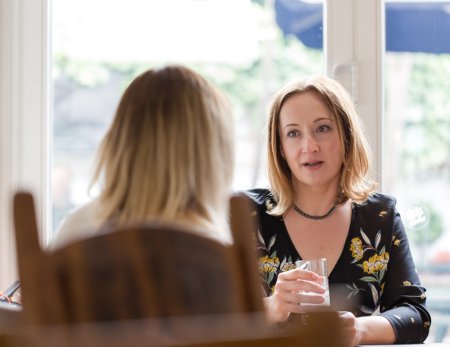- Home
- Coaching Skills
- Building Rapport in Coaching
Building Rapport In Coaching
Building rapport in coaching is probably the most important skill to develop forming the foundation of a sustainable and productive coaching relationship. Without rapport between you and your coachee you have no genuine relationship. Without a genuine relationship you will never be able to fully help your coachee reach their full potential.

What Is Rapport And How Do You Know That You Have Achieved It?
Put simply rapport in coaching is about really being able to put yourself in the shoes of your client – really tuning into who they are, where they are coming from, how they are feeling; it is about being 100% on their wavelength. You know you have achieved rapport when your coaching conversations flow, you start to feel what it is like to be in their situation and it may feel like you are talking to a close friend. When you have great rapport your coachee will open up with you and talk beyond just facts and information, readily discussing feelings and emotions.
Much has been written about developing rapport building skills and some of the theory of NLP (Neurolinguistic Programming) discusses the ways in which we can build rapport by ‘matching and mirroring’ words spoken and body language used to help tune into the person you are talking with. These are great techniques which can help, but rapport is more than just this.
Building rapport in coaching is firstly about really wanting to be there with your client and then simply listening at the deepest level in order to understand them – their values, wants and needs. This enables you to enter their world, you can talk their language and help them move forward.
8 Tips For Building Rapport In Coaching
Here are my tips for building rapport in coaching to help you become a great rapport generator and relationship builder.
Make rapport-building a priority
Remember that without rapport you have no sustainable coaching relationship so ensure that you spend as long as you need at the outset of a coaching relationship to develop this rapport.
Too often we can be focused on ‘achieving results’ for our clients but ultimately truly sustainable results will only come if true rapport is developed.
Ask rapport-building questions
Lying at the heart of establishing rapport is understanding who your client is as a person so this means getting to know not just facts and information about them but also
- what is really important to them (their values)
- what makes them tick
- what their underlying beliefs are
Ask permission at the outset to give feedback
All part of building rapport in coaching is using your senses, including intuition to pick up on what you are observing and then feeding this back to your client. However you need to ensure that at the outset of the client-coach relationship you ask permission to be able to do this.
Listen and show that you are listening
Listening is key and this means listening at levels 2 & 3 (see levels of listening) which includes not being afraid of using your intuition. But it is not enough to just listen and understand and be there with your client – they have to know that you are. So use active listening techniques to selectively feedback what you are picking up.
Talk their language
Once you are tuned into your clients you can start to speak their language. This is about picking up on their words and phrases and using these selectively in your own dialogue. This should be feel natural if you are in rapport.
Listen to establish ‘where’ your client is in your dialogue
One key factor to being in rapport is ensuring that you are at the same ‘level’ of communication with your client. When we meet someone we tend to go through a series of stages starting at initial small-talk, then discussing facts and information, then exploring beliefs and opinions and then finally feelings and emotions.
To be in rapport we need to be at the same level at any one time – rapport will not be built for example if we start exploring feelings and emotions with our coachee if they haven’t even got to the stage of exchanging facts and information.
Provide affirmations
When you tune into your client and really know where they are coming from you can pick up their strengths, qualities, attributes. Let them know what you are seeing. Often people cannot see their own qualities and it can be immensely powerful in building your relationship if you accurately feedback some strengths that you are observing.
Mirroring and matching body language
If you observe two people who are in deep rapport together you will notice their body language is mirror image of the other. In a face to face coaching session you can become an active rapport generator by ‘mirroring and matching’ their body language. As you build rapport this will come naturally. This is an NLP (Neurolinguistic Programming technique)
Understand and use these tips for establishing rapport and you will find a real opportunity to improve the relationships you have with your coachees.
Further Reading
Coaching with NLP: How to Be a Master Coach by Joseph O'Conner and Andrea Lages (Paperback - 5 April 2004)
NLP: The New Technology of Achievement by NLP Comprehensive (Paperback)
Introducing NLP: Psychological Skills for Understanding and Influencing People by Joseph O'Conner and John Seymour (Paperback - Jan 2003)
See Also:-
Preparing For Coaching
Effective Listening
Effective Questioning
Use of silence
Goal Setting
Challenging
Scaling Skills
More Coaching Skills






